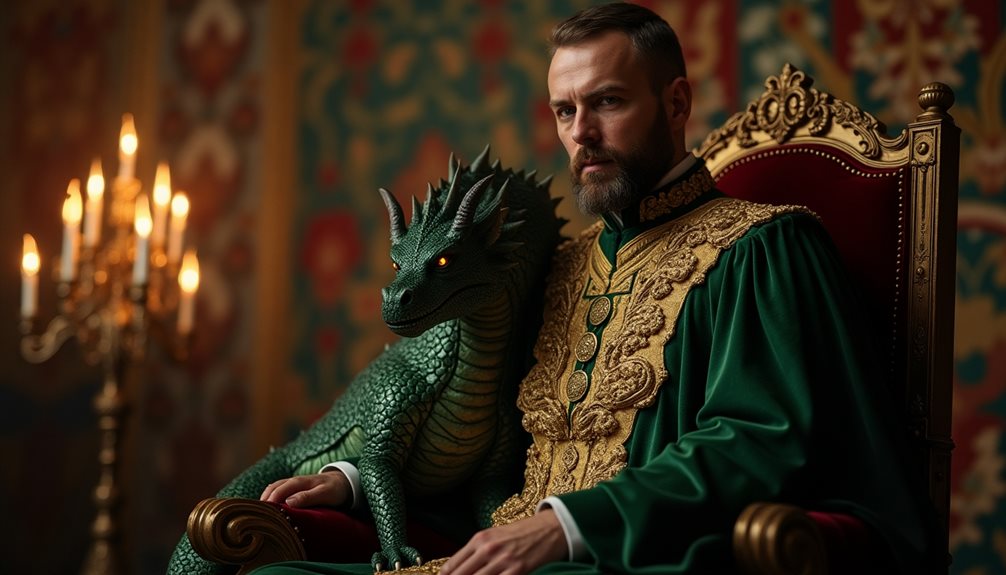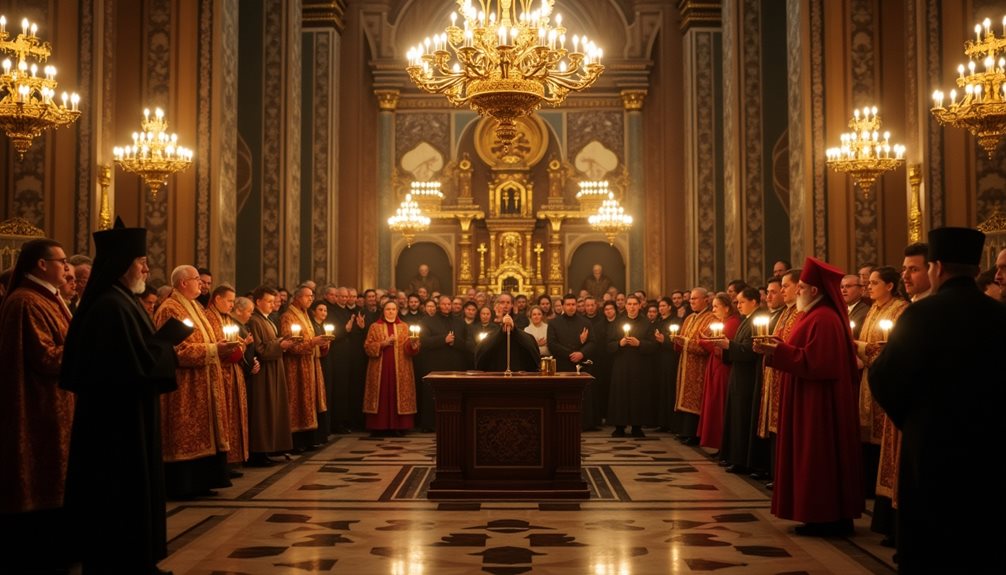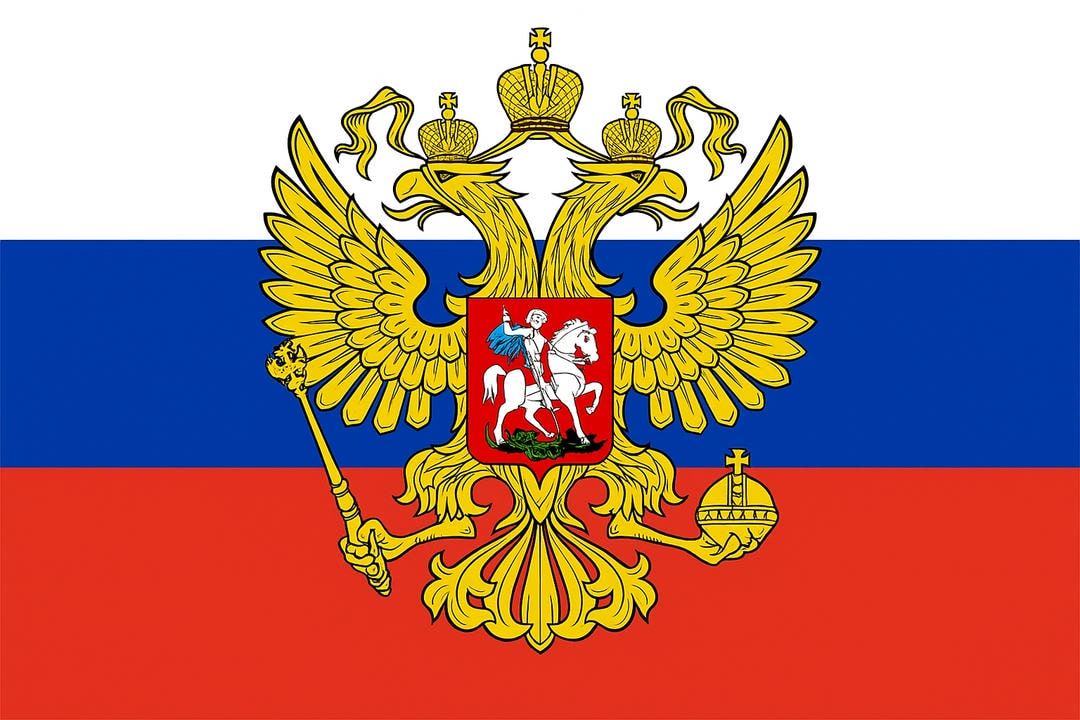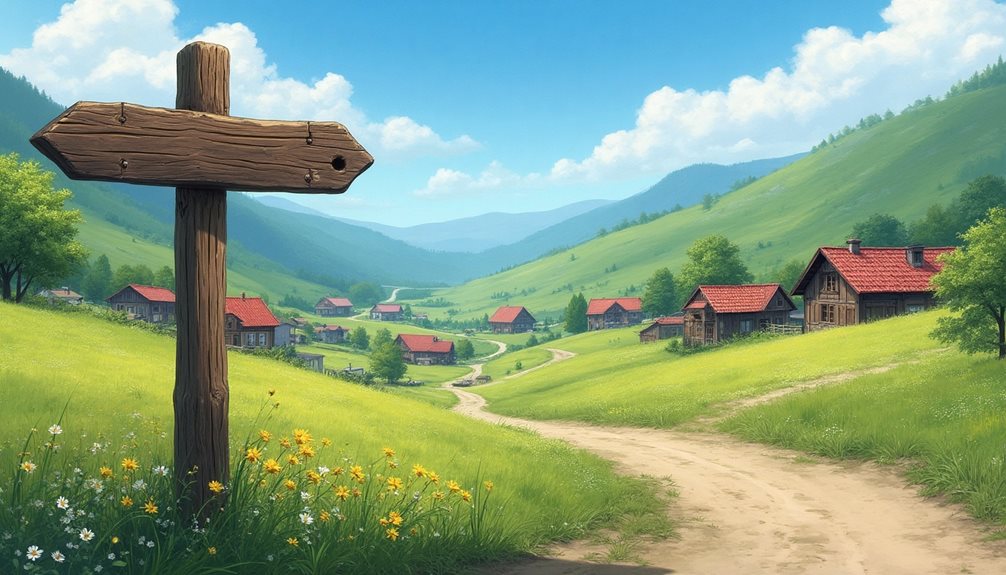When you think of Russia’s Victory Day on May 9th, you’re looking at more than just a historical event; it’s a day that weaves together national pride, collective memory, and cultural identity. You’ll notice citizens wearing St. George ribbons and honoring veterans, but what really stands out are the grand parades that sweep through major cities. So, what deeper significance does this day hold, and how does it continue to shape modern Russian society? Let’s explore what makes this annual commemoration so impactful and enduring.
Historical Background
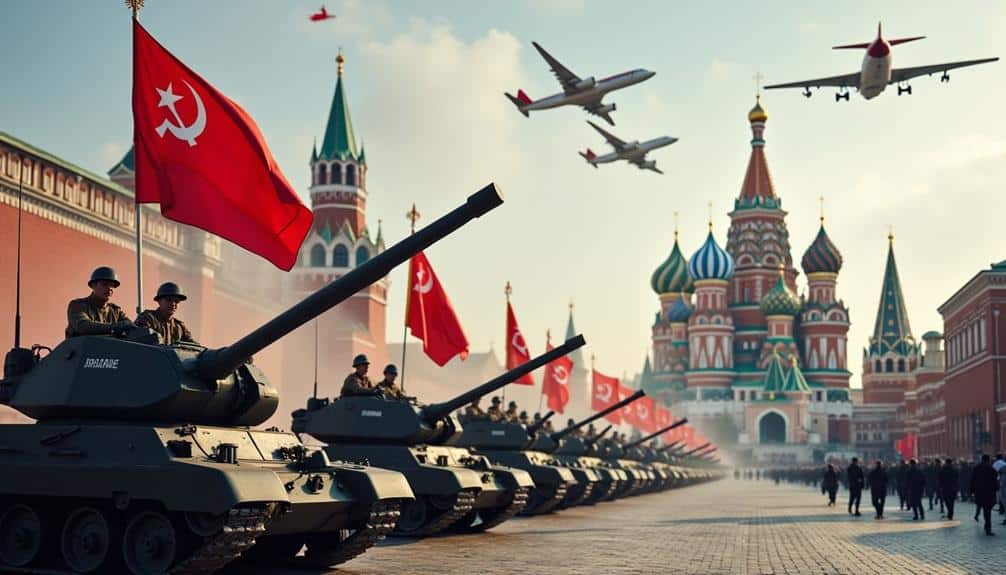
Victory Day in Russia, celebrated on May 9th, commemorates the Soviet Union’s triumph over Nazi Germany in World War II. You might wonder how this historical event came to shape the nation’s identity.
During World War II, the Soviet Union played a vital role in defeating one of the most oppressive regimes the world has ever seen. The German invasion of the Soviet Union in 1941 marked the beginning of a grueling conflict on the Eastern Front, which became one of the largest and bloodiest theaters of war.
The Soviet Union’s involvement wasn’t just about military might; it was a test of resilience and unity. Citizens from all walks of life contributed to the war effort, enduring hardships that are almost unimaginable today.
The Red Army’s eventual push into Berlin in May 1945 signaled the end of this brutal conflict in Europe. For you, understanding this background provides a glimpse into why Victory Day holds immense significance for Russians.
It’s a day that encapsulates their struggle for freedom and the sacrifices made to secure it. So, when you see the grand parades and celebrations, remember the historical roots that make this day so poignant.
Significance of May 9th
May 9th stands out as a cornerstone in Russian culture, embodying both national pride and collective memory. On this day, the entire nation pauses to honor the immense sacrifices made during World War II. You can feel the weight of history in every commemoration event, each ceremony symbolizing the resilience and bravery of those who fought against tyranny.
This isn’t just about looking back; it’s about recognizing the strength and unity that define Russia today.
The significance of May 9th goes beyond mere remembrance. It provides a powerful sense of national pride, reminding everyone of a time when freedom was won through unimaginable hardship. As you witness the sea of people wearing the iconic St. George ribbons, you can’t help but feel a deep connection to a shared past that continues to shape the present.
These commemoration events aren’t just formalities; they’re living, breathing manifestations of what it means to be Russian. They bridge the gap between generations, ensuring that the lessons of history are never forgotten.
Key Traditions
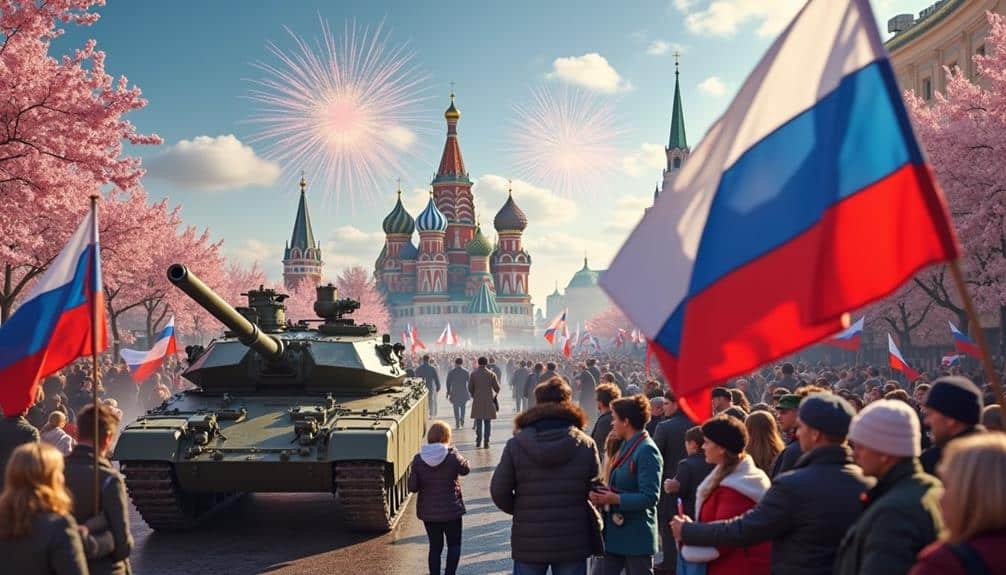
Participating in Russia’s Victory Day traditions offers a profound glimpse into the nation’s soul. You’ll see people donning traditional attire, which often includes military uniforms or St. George ribbons pinned to their clothing. This isn’t just a fashion statement; it’s a way to honor the heroes who fought for freedom.
The sight of generations coming together in these outfits is a powerful reminder of the collective memory and pride that binds the nation.
When it comes to celebratory foods, you’re in for a treat. Victory Day tables are laden with dishes that have deep roots in Russian culture, like borscht, pirozhki, and shashlik. These aren’t just meals; they’re a celebration of resilience and unity.
As you savor these flavors, you can feel the stories of hardship and triumph that each dish carries.
Another tradition you shouldn’t miss is the Immortal Regiment march. Families walk through the streets holding portraits of their ancestors who fought in the war, creating a living tapestry of memory and gratitude.
These traditions, steeped in history and emotion, offer you a unique opportunity to connect with the spirit of a proud and resilient nation.
The Military Parade
When it comes to Russia’s Victory Day, nothing quite captures the nation’s military prowess and historical reverence like the grand Military Parade. You can feel the air crackle with anticipation as the parade begins, showcasing an awe-inspiring military display.
Rows of soldiers march in perfect unison, their ceremonial attire gleaming under the sunlight. Tanks, missile launchers, and various armored vehicles roll down the streets, demonstrating the country’s formidable arsenal.
You can see the pride in every participant’s eyes, a living representation of their nation’s strength and resilience. The parade isn’t just a show of force; it’s a tribute to history, a reminder of the sacrifices made during World War II.
As you watch the aircraft soar overhead in intricate formations, you can’t help but feel a sense of shared history and unity. This elaborate display is more than just a spectacle; it serves as a rallying point for national pride and a symbol of enduring freedom.
It’s a powerful moment where you witness an entire nation’s collective memory and aspirations come to life, vividly reminding you of the desire for a peaceful yet resilient future.
Role of Veterans
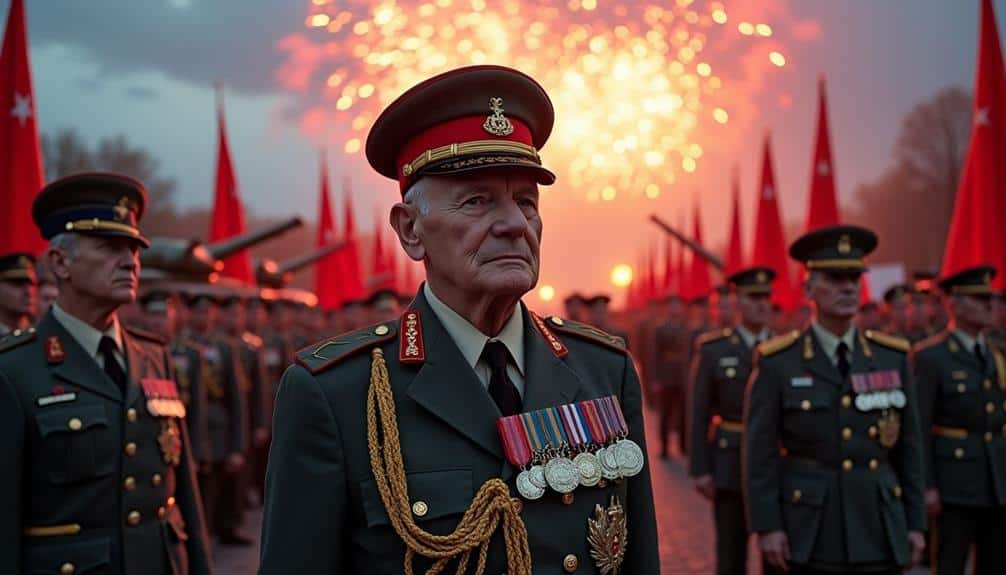
Veterans play an indispensable role in Russia’s Victory Day celebrations, embodying the living history and sacrifices of past conflicts. Their presence isn’t just a reminder of the past; it’s a demonstration of courage and tenacity.
When you listen to veteran stories, you hear about the resilience and bravery that secured freedom. These narratives aren’t just tales; they’re lessons in perseverance and commitment to a cause larger than oneself.
On Victory Day, veteran recognition is paramount. You see them adorned with medals, a symbol of their valor and dedication. They march proudly, representing the victories and the trials they endured.
This day is as much about honoring their contributions as it’s about celebrating freedom itself. Engaging with veterans allows you to understand the cost of liberty. Their stories are powerful, filled with moments that shaped history.
They remind you that the freedom you cherish today was hard-earned. By recognizing these heroes, you affirm the values they fought for. In honoring them, you acknowledge the importance of remembering and learning from the past.
It’s a poignant reminder that freedom is never free, and those who secure it deserve our highest respect.
Modern Celebrations
While honoring the heroes of the past forms the heart of Russia’s Victory Day, the modern celebrations bring a vibrant and dynamic energy to the occasion. You’ll find streets alive with color, music, and the joy of public participation that truly embodies the spirit of freedom.
People from all walks of life come together, creating a sense of unity and shared purpose. Parades are a centerpiece, featuring not just military displays, but also floats and performances that showcase the nation’s cultural richness.
Youth engagement is a significant aspect of modern celebrations. Young people are encouraged to take part in various activities, from historical reenactments to creative workshops. Schools often organize events that educate students about the significance of Victory Day, fostering a sense of pride and awareness among the younger generation.
You’ll see them carrying flags, wearing period costumes, and even performing songs and dances that pay tribute to the sacrifices made by their forebears.
Moreover, social media buzzes with shared experiences and live updates, allowing you to connect with others who are equally passionate about the day. These modern celebrations not only honor the past but also inspire a collective hope for the future.
International Observances
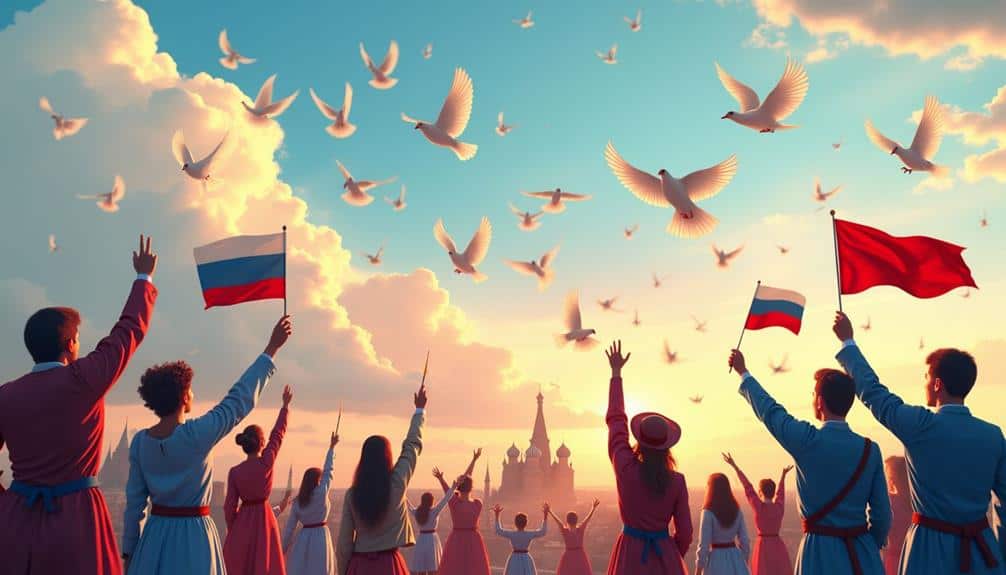
Victory Day’s significance extends beyond Russia’s borders, finding resonance in various countries around the globe. It’s a day that marks the end of a brutal chapter in world history, and its observance brings forth varied global reactions.
Countries like Belarus, Kazakhstan, and Israel hold ceremonies that underscore their own experiences and sacrifices during World War II. Even nations with complex historical ties to Russia, such as Germany and Japan, recognize the day with a mix of solemn remembrance and diplomatic implications.
You might be surprised to learn that Victory Day often sparks both unity and controversy. On one hand, it serves as a reminder of the collective fight against tyranny, fostering a sense of global solidarity.
On the other, it can be a diplomatic minefield. For countries wary of Russia’s current geopolitical actions, participating in Victory Day celebrations can seem like a tacit endorsement of its policies. This duality makes international observances a delicate balance of honoring the past while maneuvering present-day tensions.
Cultural Impact
The cultural impact of Victory Day in Russia is profound and multifaceted, reflecting the nation’s deep connection to its World War II history. When you participate in Victory Day celebrations, you’re not just observing a holiday; you’re embracing a powerful sense of cultural symbolism and national identity. The parades, the St. George ribbons, and the stories shared by veterans are all symbols that evoke pride and resilience. They remind you that the fight for freedom and survival has shaped the very soul of the nation.
Victory Day is more than a historical commemoration; it’s a living, breathing expression of Russia’s collective memory. The music, the monuments, and the reenactments you witness are all imbued with a deep sense of respect and gratitude. They serve as a stark reminder of the sacrifices made for the liberties enjoyed today.
You can feel a palpable sense of unity and national identity as people from all walks of life come together to honor their shared past. Engaging with Victory Day allows you to appreciate how deeply the events of World War II are woven into the fabric of Russian culture. It’s a vivid illustration of the enduring spirit of a people who cherish their history and freedoms.

